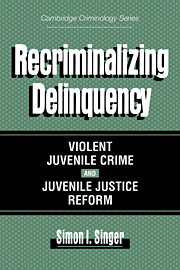Book contents
- Frontmatter
- Contents
- List of Figures and Tables
- Acknowledgments
- Introduction
- 1 Recriminalizing Violent Juvenile Crime
- 2 Taking Stock of Juvenile Justice Reforms
- 3 Recriminalization on the Move and Its Legal Rules
- 4 Contextual and Legal Reasons for Identifying Juveniles as Criminal Offenders
- 5 The Case Processing of Juvenile Offenders: From Arrest to Disposition
- 6 Recriminalization and Organizing for Deterrence
- 7 Convicted Juvenile Offenders in a Maximum Security Institution
- 8 Concluding “Real” Reasons for Recriminalizing Delinquency
- Appendixes
- Notes
- References
- Index
8 - Concluding “Real” Reasons for Recriminalizing Delinquency
Published online by Cambridge University Press: 29 September 2009
- Frontmatter
- Contents
- List of Figures and Tables
- Acknowledgments
- Introduction
- 1 Recriminalizing Violent Juvenile Crime
- 2 Taking Stock of Juvenile Justice Reforms
- 3 Recriminalization on the Move and Its Legal Rules
- 4 Contextual and Legal Reasons for Identifying Juveniles as Criminal Offenders
- 5 The Case Processing of Juvenile Offenders: From Arrest to Disposition
- 6 Recriminalization and Organizing for Deterrence
- 7 Convicted Juvenile Offenders in a Maximum Security Institution
- 8 Concluding “Real” Reasons for Recriminalizing Delinquency
- Appendixes
- Notes
- References
- Index
Summary
both the real and legal reasons for recriminalizing delinquency go beyond the case of Willie Bosket and sudden concerns about violent juvenile crime. While legal rules for waiver reforms draw on the logic of deterrence and past precedents for mandating criminal responsibility, I have argued that the real reasons for their creation and implementation are political and organizational. Real reasons for recriminalization emerge as a consequence of political and organizational concerns and interests in maintaining the legitimacy of loosely coupled systems of juvenile and criminal justice. In response to modern-day crisis, they produce the unique legal avenues for classifying and tracking juveniles as offenders.
In suggesting that there are real reasons for recriminalization that go beyond the legally stated ones, I do not pretend to know all the political and organizational concerns and interests that have led to the creation and implementation of waiver legislation. I have repeatedly argued, however, that the reforms are not purely symbolic, generated merely to satisfy immediate political interests in doing something about violent juvenile crime. In the pages that follow, I list first the reasons for recriminalization as generated from my case study of the creation and implementation of New York's JO law. Then I discuss policy implications and future research directions.
Real Reasons for Recriminalization
The reasons for the particular shape of recriminalization in New York stem first from its unique history of juvenile justice reforms.
- Type
- Chapter
- Information
- Recriminalizing DelinquencyViolent Juvenile Crime and Juvenile Justice Reform, pp. 187 - 196Publisher: Cambridge University PressPrint publication year: 1996

